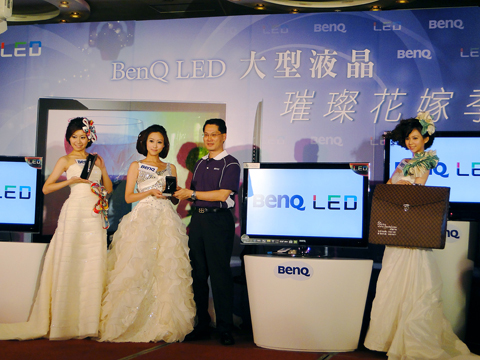Electronics maker BenQ Asia Pacific Corp (明基亞太) yesterday said it expects local sales of LCD TVs to grow by 20 percent this year, as more consumers are buying slim TVs with the new LED backlighting technology.
BenQ aims to sell about 120,000 LCD TVs in Taiwan, including the newly launched LED TVs, by the end of the year compared with last year’s 100,000 units, Taiwan managing director Danny Yao (姚鴻州) told reporters.
The target is achievable as more consumers are buying LCD TVs that have LED backlighting rather than the fluorescent lights used in traditional LCD televisions. LED TVs are said to be more energy efficient, environmentally friendly and much slimmer.

PHOTO: LEE YI-JU, TAIPEI TIMES
The company debuted its first LED TV yesterday, a 42-inch model that carries a price tag of NT$43,900 (US$1,362). A similar product from Sony Corp costs more than NT$50,000, BenQ said.
More models ranging from 32 inches to 55 inches are expected to hit local stores during the second half, Yao said.
BenQ expects its sales of LED TVs alone will be 18,000 units by the end of the year, he said.
BenQ is not alone in eyeing consumers who want to upgrade their traditional TV sets or ditch their fluorescent-lighting LCD TVs.
TPV Technology Ltd (冠捷), the world’s largest contract monitor maker, debuted its first range of LCD monitors bearing its own brand name AOC at the beginning of the year.
The company said last week it would start selling LCD TVs, including models with LED backlights, in Taiwan next year.

SEEKING CLARITY: Washington should not adopt measures that create uncertainties for ‘existing semiconductor investments,’ TSMC said referring to its US$165 billion in the US Taiwan Semiconductor Manufacturing Co (TSMC, 台積電) told the US that any future tariffs on Taiwanese semiconductors could reduce demand for chips and derail its pledge to increase its investment in Arizona. “New import restrictions could jeopardize current US leadership in the competitive technology industry and create uncertainties for many committed semiconductor capital projects in the US, including TSMC Arizona’s significant investment plan in Phoenix,” the chipmaker wrote in a letter to the US Department of Commerce. TSMC issued the warning in response to a solicitation for comments by the department on a possible tariff on semiconductor imports by US President Donald Trump’s

‘FAILED EXPORT CONTROLS’: Jensen Huang said that Washington should maximize the speed of AI diffusion, because not doing so would give competitors an advantage Nvidia Corp cofounder and chief executive officer Jensen Huang (黃仁勳) yesterday criticized the US government’s restrictions on exports of artificial intelligence (AI) chips to China, saying that the policy was a failure and would only spur China to accelerate AI development. The export controls gave China the spirit, motivation and government support to accelerate AI development, Huang told reporters at the Computex trade show in Taipei. The competition in China is already intense, given its strong software capabilities, extensive technology ecosystems and work efficiency, he said. “All in all, the export controls were a failure. The facts would suggest it,” he said. “The US

The government has launched a three-pronged strategy to attract local and international talent, aiming to position Taiwan as a new global hub following Nvidia Corp’s announcement that it has chosen Taipei as the site of its Taiwan headquarters. Nvidia cofounder and CEO Jensen Huang (黃仁勳) on Monday last week announced during his keynote speech at the Computex trade show in Taipei that the Nvidia Constellation, the company’s planned Taiwan headquarters, would be located in the Beitou-Shilin Technology Park (北投士林科技園區) in Taipei. Huang’s decision to establish a base in Taiwan is “primarily due to Taiwan’s talent pool and its strength in the semiconductor

French President Emmanuel Macron has expressed gratitude to Hon Hai Precision Industry Co (鴻海精密) for its plan to invest approximately 250 million euros (US$278 million) in a joint venture in France focused on the semiconductor and space industries. On his official X account on Tuesday, Macron thanked Hon Hai, also known globally as Foxconn Technology Group (富士康科技集團), for its investment projects announced at Choose France, a flagship economic summit held on Monday to attract foreign investment. In the post, Macron included a GIF displaying the national flag of the Republic of China (Taiwan), as he did for other foreign investors, including China-based